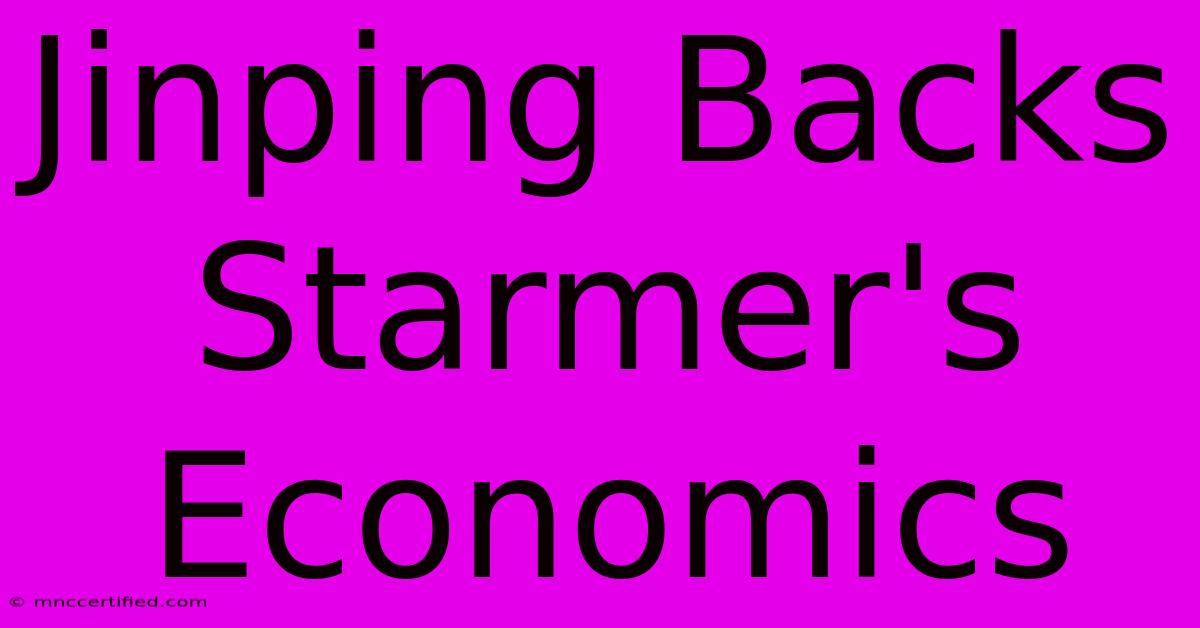Jinping Backs Starmer's Economics

Table of Contents
Jinping Backs Starmer's Economics: A Surprising Alignment?
The political landscape is rarely predictable, and recent developments suggest an unexpected convergence of economic philosophies. While seemingly worlds apart ideologically, there are intriguing parallels between the economic policies subtly championed by Xi Jinping's China and those advocated by Keir Starmer's Labour Party in the UK. This article will explore the surprising alignment between Jinping's approach to state-led development and Starmer's focus on strategic industrial policy, examining the potential implications for both domestic and international economics.
State Intervention: A Shared Thread
Both Xi Jinping and Keir Starmer, despite their vastly different political systems, exhibit a belief in the crucial role of the state in shaping economic outcomes. This contrasts sharply with the neoliberal orthodoxy that has dominated Western economies for decades, emphasizing deregulation and free-market principles.
Jinping's State-Led Growth
China's remarkable economic rise under Xi Jinping has been largely driven by state intervention. The Chinese government actively guides investment, promotes strategic industries, and exerts significant control over key sectors like technology and energy. This approach, often characterized as state capitalism, prioritizes national interests and long-term strategic goals. Key initiatives like "Made in China 2025" exemplify this focus on technological self-reliance and industrial dominance.
Starmer's Embrace of Strategic Industrial Policy
While significantly less interventionist than China's model, Keir Starmer's Labour Party has increasingly embraced strategic industrial policy as a key element of its economic platform. This involves targeted government investment in key sectors deemed crucial for future economic growth and national security. This includes areas like renewable energy, advanced manufacturing, and technology, mirroring some of the priorities of China's state-led development strategy. This approach prioritizes "levelling up" the UK, addressing regional inequalities through focused investment.
Divergent Approaches, Convergent Goals?
Despite the shared emphasis on state intervention, crucial differences remain between the Chinese and British approaches. China's model is characterized by a much higher degree of state control and a more centralized planning process. Starmer's Labour, while advocating for a more active role for the state, remains committed to a market-based economy with significant private sector participation. This distinction is vital.
Transparency and Accountability: A Key Difference
A major point of divergence lies in transparency and accountability. China's state-led model often lacks the transparency and checks and balances present in more democratic systems. This raises concerns regarding potential corruption and inefficient allocation of resources. Starmer's proposals, while advocating for state intervention, emphasize the need for accountability, transparency, and rigorous evaluation of government investments.
Geopolitical Implications
The potential convergence of economic philosophies between Jinping and Starmer carries significant geopolitical implications. It could potentially lead to a reassessment of traditional alliances and reshape the global economic landscape. The shift away from pure free-market orthodoxy could also influence other nations' economic policies, leading to a more diversified approach to state intervention.
A New World Economic Order?
This unexpected alignment prompts questions about the future of globalization and the potential emergence of a new world economic order. While significant differences remain, the shared emphasis on strategic industrial policy and state intervention suggests a potential shift in the prevailing economic paradigm.
Conclusion: More Questions Than Answers
The apparent convergence between Jinping's and Starmer's economic thinking raises more questions than answers. While the scale and nature of state intervention differ significantly, the underlying principle of prioritising national interests and strategic industries represents a notable shift away from purely free-market approaches. Further analysis is needed to fully understand the implications of this unexpected alignment for global economics and geopolitical dynamics. This is a developing story, and continued observation is crucial to fully grasping its ramifications. The future will reveal whether this convergence is a temporary phenomenon or marks a fundamental rethinking of economic policy on a global scale.

Thank you for visiting our website wich cover about Jinping Backs Starmer's Economics. We hope the information provided has been useful to you. Feel free to contact us if you have any questions or need further assistance. See you next time and dont miss to bookmark.
Featured Posts
-
Live Nigeria Vs Rwanda Super Eagles
Nov 19, 2024
-
Portugals Antibiotics Usage Persists
Nov 19, 2024
-
Canadian Auto Exports Portugals Market
Nov 19, 2024
-
Chiefs Bills Game 7 Kelce Photos
Nov 19, 2024
-
Lenders Title Insurance Vs Owners
Nov 19, 2024